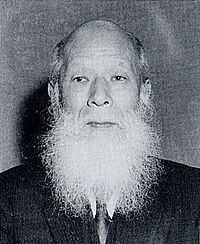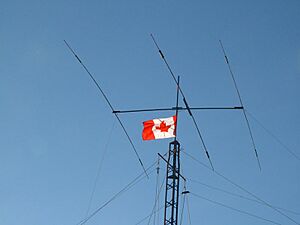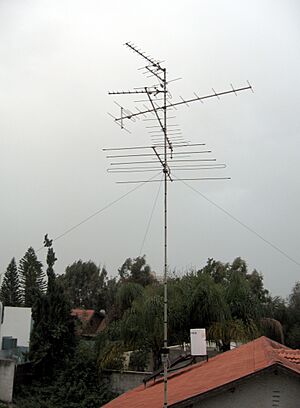Hidetsugu Yagi facts for kids
Quick facts for kids
Hidetsugu Yagi
|
|
|---|---|
| 八木 秀次 | |
 |
|
| Born | January 28, 1886 |
| Died | January 19, 1976 (aged 89) |
| Nationality | Japanese |
| Occupation | Engineering scientist |
| Known for | Yagi–Uda antenna |
| Awards | Blue Ribbon Award (1951), the Order of Culture (1956) and the Order of the Rising Sun, First Class (1976) |
| Scientific career | |
| Fields | Electrical engineering |
Hidetsugu Yagi (八木 秀次, Yagi Hidetsugu, January 28, 1886 – January 19, 1976) was a Japanese electrical engineer from Osaka, Japan. He was a brilliant scientist who made a huge difference in how we use radio waves.
While working at Tohoku Imperial University, he helped share a new type of antenna with the world. This antenna was designed by his assistant, Shintaro Uda.
The Yagi-Uda antenna was patented in 1926. It helps send and receive radio signals in a specific direction. Today, millions of homes around the world use this antenna for their radio and television. He also tried to create a system for sending power without wires, but it was not successful. He also helped start the Chiba Institute of Technology.
Hidetsugu Yagi was also the president of several important universities. He led Osaka University for a short time in 1946. He also became president of Tokyo Institute of Technology in 1942. For his amazing work, he received several awards. These included the Blue Ribbon Award in 1951 and the Order of Culture in 1956. After he passed away in 1976, he was given the Grand Cordon of the Order of the Rising Sun.
Contents
Early Life and Education
Hidetsugu Yagi was born on January 28, 1886, in Osaka Prefecture, Japan. He was very interested in how electricity works. In 1909, he finished his studies in Electronic Engineering at the Tokyo Imperial University.
From 1913, Yagi traveled to different countries to learn more. He studied in Germany, where he worked on creating continuous radio waves. In England, he worked with J.A. Fleming, who invented the vacuum diode. This was an important part of early electronics.
He also studied in the United States at Harvard University. There, he worked with G. W. Pierce, who invented the Pierce oscillator. This device also helped create continuous waves. Yagi earned his doctorate degree from Tokyo Imperial University in 1921. He returned to Japan in 1930, bringing back a lot of new knowledge.
Developing Wireless Communication


Hidetsugu Yagi spent his whole life researching wireless communication. This was a topic he became very passionate about during his studies abroad. In 1919, he became a professor at Tohoku Imperial University. In the same year, he also earned his Doctor of Engineering title.
Yagi had a special vision for the future. He believed that short waves and ultra-short waves would become key for radio communication. He focused his research on this idea. This led to him publishing important papers like "Generation of Short Wavelength Waves."
His most famous invention, the Yagi antenna, came from this research. He called it his "method for directional electric waves." He received the patent for this invention in 1926.
The Yagi Antenna's Impact
The Yagi antenna has a very simple design. This makes it easy to build and use. It allows radio waves to be sent and received in a specific direction. This was a huge step forward for wireless communication.
Even today, this basic design is used in almost every type of antenna. You can find it in antennas for ultra-short and extremely short waves. This includes antennas for your TV and many other devices.
Because of his amazing work, the Japan Patent Office chose him as one of Ten Japanese Great Inventors in 1985. On January 28, 2016, Google honored his work with a special animated Google Doodle.
See also
In Spanish: Hidetsugu Yagi para niños

